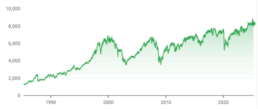Markets have been volatile over the past few weeks after the US president, Donald Trump, declared 2 April 2025 as “Liberation Day” and imposed sweeping tariffs on imports from countries around the world.
According to Trump, the aim is to incentivise domestic production and make American industry more competitive.
All countries face a baseline tariff of 10%, with higher rates for specific nations, including:
- 20% on the European Union
- 24% on Japan
- 32% on Taiwan
- 46% on Vietnam.
China was hit the hardest by tariffs, with multiple rounds of retaliation resulting in a 145% charge on Chinese goods entering the US.
The UK escaped the worst of the tariffs, facing just the baseline 10% charge. Still, these levies had an immediate knock-on effect on global markets.
Dramatic market movements can be challenging to interpret
On 3 April 2025, just one day after Liberation Day, the BBC reveals that the:
- S&P 500 fell by 4.8%, losing roughly $2 trillion in value
- Dow Jones closed around 4% lower
- Nasdaq fell by 6%.
Even markets across the pond weren’t immune, with the FTSE 100 dropping by 1.5% and other European indices also declining.
Markets recovered somewhat after Trump announced a 90-day pause on many new tariffs on 9 April 2025.
While a minimum 10% blanket rate remained, and China’s 145% still in place, investors did respond positively.
Indeed, Reuters reports that just hours after the pause, the S&P 500 rose by 7%, while the Nasdaq jumped more than 9%.
These dramatic market movements can be challenging to interpret, and at times, it might feel like media noise is dictating the swings.
Even though it’s understandable to feel uncertain, staying calm and focusing on your long-term goals could be more beneficial – continue reading to find out why.
Volatility is often an inherent part of investing
Before reacting emotionally to events such as sudden market declines or external politics, it’s essential to recognise that volatility is not unusual.
In fact, it’s a fundamental and unavoidable aspect of investing, and throughout history, markets have risen and fallen.
Take, for example, the graph below, which shows the performance of the FTSE 100 stock market index between 19 April 1985 and 16 April 2025:

Source: Google Finance
As you can see, the index has experienced several significant downturns over the past 40 years, including the:
- Bursting of the dot-com bubble in 2000
- 2008 financial crisis
- Beginning of the COVID-19 pandemic in 2020
Each of these events resulted in significant losses in the short term. Yet, looking at the overall trend, it shows that the market has generally moved upwards, recovering from each event and growing over time.
It’s also worth noting that temporary declines of 10% or more – known as “market corrections” – are more common than you may think.
Fidelity reports that since 1980, the S&P 500 in the US has seen a correction of 10% or more in 47% of calendar years.
This suggests that temporary downturn is almost inevitable, but patience could help you remain on track to achieve your long-term goals.
Though of course, it’s important to remember that the value of your investments (and any income from them) can go down as well as up and you may not get back the full amount you invested. And past performance is not a reliable indicator of future performance.

You could harm the value of your portfolio by attempting to time the market
There’s a chance you may have heard the phrase “time in the market, not timing the market”, and this adage holds true to this day.
When volatility occurs, it can be tempting to make hasty decisions. You may feel that selling your investments is the safest option, perhaps with the intention of reinvesting when the market reaches a “bottom”.
In reality, identifying the lowest point is incredibly difficult, and even the most seasoned investors struggle with this.
Reacting emotionally to short-term volatility could mean realising losses that might have potentially recovered, and you may miss out on some of the market’s best days in turn.
In fact, research from Visual Capitalist shows that, over the past 20 years, 7 of the 10 best-performing days for the S&P 500 occurred during bear markets – that is, when markets decline by 20% or more.
More specifically, the second-best day of the year in 2020 occurred just one day after the second-worst, while the best-performing day in 2015 happened only two days after the year’s worst.
Missing even a few of these days could significantly harm the overall value of your portfolio.
According to the source above, if you had invested $10,000 in the S&P 500 between 1 January 2003 and 30 December 2022, and remained invested the entire time, your average annual return might have been 9.8%.
Yet, if you had missed the 30 best-performing days during this 20-year period, your average returns would have reduced to 0.8%. Miss 60, and you could have faced more than 4% annual losses.
This is why investing with a long-term mindset allows you to benefit from the overall growth of markets, even if they do experience fluctuations.
Want to understand what the Autumn Budget could mean for your portfolio?
Visit our dedicated Autumn Budget Hub for the latest updates and insights.
An Amber River financial planner could help you work towards your long-term goals
Periods of volatility and uncertainty can understandably be nerve-wracking. When markets move so quickly and the news changes each day, it’s easy to feel overwhelmed.
Despite this, reacting emotionally can often do more harm than good.
This is where working with a financial planner can be beneficial. A financial planner from Amber River could help you focus on the horizon and continue working towards your long-term goals.
By understanding your appetite for risk, investing time frame, and unique circumstances, they can help create a diversified portfolio tailored to your needs.
Having a financial planner in your corner can provide some much-needed guidance during periods of uncertainty, ensuring that you respond to facts, rather than emotive headlines.
Get in touch
Speak to an Amber River financial planner today. Call us on 0800 915 000, or complete the form below to arrange a meeting.
Stay on Track with Your Financial Goals
We’ve helped individuals navigate uncertainty and build resilient investment strategies tailored to their long-term ambitions.
Speak to a financial planner today to create a plan that gives you confidence—whatever the markets are doing.
Arrange a Callback
Fill in the enquiry form, and a member of our team will call you back to arrange a meeting.
Disclaimer
The information within this article was correct at the time of publishing, but laws and tax rules are subject to change. Your circumstances and where you live in the UK may also have an impact on your tax treatment.
Related Posts
20 February 2026
Read More

12 February 2026
Read More





